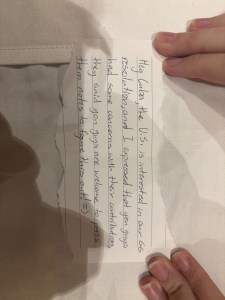
GA Plenary: The Notes Passed Around the Room: United States of America and Cuba Clash Over Draft Resolution GG – Erupts Into Full Diplomatic Crisis
By: Grace Loidolt
A routine exchange of notes in the General Assembly Plenary escalated into the most heated diplomatic confrontation of the conference so far. A series of messages between Representative Megan Carter of Cuba and Representative Charlie Schmidt of the United States of America transformed a technical debate over draft resolution GG into a full-blown ideological crisis. The chain reaction began quietly when the Representative, who wishes to remain anonymous, informed Representative Carter from Cuba of a suspension of the meeting update, informing them that Representative Schmidt, of the United States, was interested in discussing contributions to the resolution drafted by Afghanistan. The note from the Anonymous Representative read:

“Hey Cuba, the U.S. is interested in our GG resolution… they said you’re welcome to pass them notes to figure this out! =)” The Representative from Cuba responded, and then the United States joined the dialogue.

U.S. Representative Schmidt wrote in response, “We support individual solutions to the problems of ports. It is unfair to make them all public or all private. Should be individualized approach.”
Cuba’s Representatives replied with, “Your opinion is noted and will be given the attention Cuba believes it deserves.”
The Representatives from the United States sent back a second note stating, “If I call your resolution communist, it won’t pass. Maybe it would be best to work with us to address our differences.”

That line spread through the room like a shockwave. Representatives from all corners of the room described the wording as “diplomatically discourteous” according to Rule 2.2. This note could indicate a deliberate strategy to undermine Cuba’s representative’s credibility across the docket, not just on draft resolution GG.
Both Representatives of Cuba then addressed the matter publicly. During their formal address, Cuban Representative Carter denounced Representative Schmidt for attempting to intimidate a smaller state into compliance. The speech blended both outrage and broader geopolitical context, emphasizing that Cuba, as a small island developing state, faces disproportionate vulnerability to climate impacts and economic restrictions. Citing Hurricane Melissa’s catastrophic damage, 2.2 million affected, 95,000 homes damaged, over 54,000 people in shelters, the Cuban representatives argued that ideological pressure from powerful nations only deepens their struggles. Their message to the room was clear: “We are willing to collaborate, but never under coercion.”
The Chair was forced to intervene shortly after, reminding Representatives of Rule 2.5 governing rights of reply and warning against the misuse of procedural points. “There shall be no reply to a reply,” the Chair emphasized, urging the body to stay focused on substance rather than personal or ideological attacks.
Not all Representatives supported Cuba’s decision to bring the dispute to the floor. Representative Maddison Patman of Panama delivered a sharp critique, arguing that Cuba’s Representatives should have handled the issue privately through the correct procedural channels. “Why bring this to the stand? And if you’re a communist country, why be offended by being called communist?”
Meanwhile, the Representative Tarik Alduri of Afghanistan, the original author of draft resolution GG, called for peace, cautioning Representatives against forming hardline blocs or allowing ideological disputes to derail progress. Representative Alduri of Afghanistan said.“We must move past the squabbling. We must focus on real work so all people can prosper.”
One voice remained conspicuously absent throughout the controversy: the United States. Multiple attempts were made to contact the Representatives. They were not able to be reached for a comment, leaving their perspective unaccounted for as the situation escalated.
With accusations of ideological manipulation now shaping the narrative, alliances shifting and tensions rising, draft resolution GG, once a detailed but technical proposal on port infrastructure and maritime accountability, has become the symbolic battleground for a larger struggle over diplomatic power, respect for sovereignty and the treatment of small states on the international stage. Cuba addressed the issue further at its Sunday, 23 November press conference, where the Representative elaborated on the note exchange, the alleged threats, and the future of their stance on the resolution. How the room responds may determine whether this confrontation burns out or ignites an even deeper divide.
Keep Up With The Accords
More to read
The AMUN Accords is a premier resource for fact-based Model United Nations simulations. We are always looking for new contributors. Want to write for the AMUN Accords? Check out out the submission guidelines and then get in touch!

